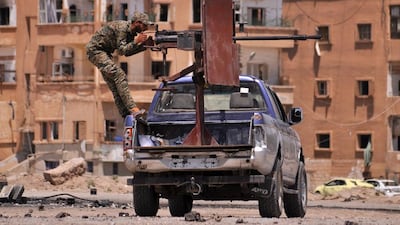In the Kurdish city of Nusaybin, on Turkey’s frontier with Syria, rebels from the outlawed Kurdistan Workers Party (PKK) are leading an armed urban uprising against the Turkish government that is transforming a border region already gripped with strife.
Hastily made barricades have left the streets bare of paving stones. Behind them, the guerrillas and the neighbourhoods’ working-class occupants are the new front line of the reignited three-decade-old conflict between Turkey and its Kurdish minority.
Militias inspired by the Kurdish fight for autonomy in Syria launch incessant hit-and-run attacks on Turkish police and soldiers, while residents hang blankets on clotheslines to try to obstruct the line of fire from Turkish snipers.
The irregular war engulfing the cities of south-east Turkey since the collapse of the peace process between Ankara and the PKK, which is considered a terrorist organisation by the United States and the European Union, threatens the entire stability of Turkey and especially the border that should separate it from the multifaceted war in Syria.
Ankara’s expanding war with the Kurdish rebels is obliterating the border and blurring the lines of conflict.
Turkish Kurds have flowed into the ranks of the People’s Protection Units (YPG) in Syria since the 2014 battle for Kobane against ISIL. This fuelled concern in Ankara that these fighters, who have been armed and aided by the US, will return to take up arms against Turkey. It seems that those fears have become reality.
When I met Botan Dersim – the nom-de-guerre of a PKK commander in Nusaybin sent from the guerrilla army’s headquarters in Iraq’s Qandil Mountains to organise local Kurdish militias in the border town – he was clear about the YPG’s influence. He acknowledged that Turkish Kurds who had returned from Syria were now part of the PKK’s expanding forces and he described how the organisation of his local forces mirrored the organisation of the YPG units in Syria.
It is this close coordination between the Kurdish armed groups on both sides of the border that has alarmed Turkey and led it to launch a campaign of cross-border shelling on Kurdish forces and towns in Syria. Ankara is worried about the effects the Syrian Kurds’ declaration of a federated region would have on the political aspirations of its own Kurdish population. The close political and ideological union between the PKK and the Syrian YPG heightens this anxiety.
Nine month ago, Kurds in Turkey believed strongly in a peace process that they hoped would provide them national minority rights and free their jailed leader, Abdullah Ocalan.
But negotiations have broken down, and Ankara has launched a devastating counter-insurgency after a string of attacks across the country that the Kurds believe was designed to ensure victory for the government at last November’s elections. Many Kurds see only a future of expanding conflict.
For people in the southeastern Turkish cities consumed by bombardment and bitter street fighting that mirrors scenes from across the border, affinity with Syrian Kurds is far stronger than any belief that Turkey will embrace their demands for national rights.
Cross-border tensions boiled over when Syrian YPG forces overran Turkish-backed rebels near its border. Turkey responded by shelling them – in effect, a declaration that it won’t let its border with Syria contain its campaign against Kurdish forces who are loyal to Ocalan’s movement.
On the streets of Diyarbakir, the YPG’s successes in Syria have achieved iconic status. The recent fighting and intense bombardment of PKK rebels and residents in the old city has extinguished the last glimmers of hope of a political resolution. In place of faith in their elected representatives in the Turkish parliament, Turkey’s Kurds increasingly look at the YPG’s success in Syria as inspiration for a military solution.
Dersim says fighters like him have been leaving their mountain bases in Iraq and now are fanning out across south-east Turkey for an expanded urban insurgency that also targets major Turkish cities.
During the two years of peace talks, Kurdish forces primarily focused their fight against ISIL. The PKK units in Qandil were mostly sent throughout northern Iraq to bolster the western-backed and Turkish-allied Peshmerga forces of the Kurdistan Regional Government. In Syria, the YPG was the main force able to contain and push back the jihadist forces.
Now, as conflict ignites in south-east Turkey, PKK forces in Iraq are prepared to expand the fight against Turkey instead of ISIL. The YPG may still be primarily engaged in a battle with ISIL but it has also been distracted by Turkish shelling and its decisions to seize territory from Turkish-backed Free Syrian Army rebels in Aleppo under cover of Russian bombing.
ISIL-linked attacks in Turkey and Europe have only increased amid the devastation created by Kurdish militants bombing the heart of Ankara and the destruction caused by Turkish shells landing on the town of Cizre or across the border in Azaz.
The ability to fight ISIL and other takfiri groups on the front lines in Syria and Iraq is clearly hampered by the expanding conflict between Turkey and the Kurds.
In a volatile region already rife with weapons and people smuggling, the fog of another war may render the Syria-Turkey border irrelevant.
The suffering from both conflicts will only be compounded as they bleed into each other, while the opportunities it creates for jihadists to slip across the Syrian border to launch attacks in Turkey and Europe will only add to the pain.
Jesse Rosenfeld is a freelance journalist in Beirut

